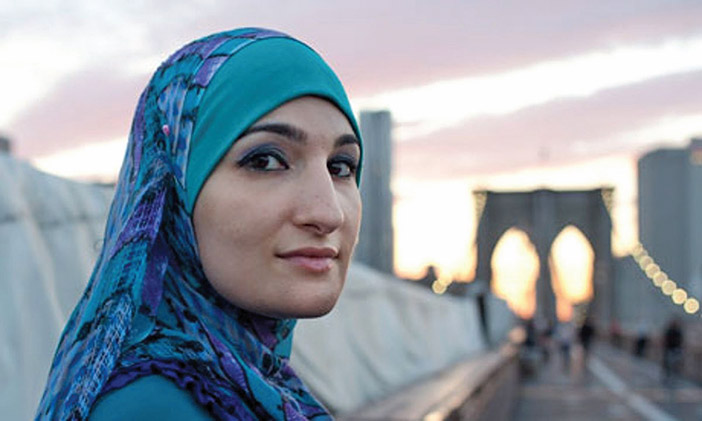
“I am honored and grateful to God that he chose to let this Palestinian blood run through my veins.”
That April 1 tweet by Arab-American activist Linda Sarsour caught my eye. At first, noting the date of her tweet, I thought that Sarsour might just be kidding around. But no, it was no April Fool’s Day joke. It was just another attempt by Sarsour to make fools out of the American public.
It’s the mass Arab violence at the Gaza border that set Sarsour off on this latest tirade. “Thinking of my Palestinian sisters and others and sending them gratitude for their sacrifices,” she declared in her tweet, vicariously enjoying the thrill of watching other Arabs throw firebombs at Jews, while she tweets from her comfortable home in Brooklyn. Sarsour wrote that she is “honored” to have all that “Palestinian blood” in her veins, because it is “a blood of a courageous, determined and resilient people.”
I’m not sure what exactly is so courageous about lighting a bottle full of gasoline and hurling it at the Israelis on the other side of the Gaza border fence. Trying to burn Jews to death doesn’t take courage; it takes a level of viciousness and immorality that most decent people instinctively abhor. It’s an act of war. No wonder polls have consistently shown, for decades, that very few Americans sympathize with the Palestinian Arab cause.
Sarsour’s weird proclamation about “Palestinian blood” is part of the never-ending, but never-successful, campaign to win Americans to the Palestinian cause. She thinks that if she and her comrades can prove that the Palestinians are a separate, distinct national group, they should be given their own sovereign state. Now, she apparently believes that they have distinct blood, too.
Let’s take a quick look at the history of El-Bireh, the town from which Sarsour’s parents came, and see if we can figure out what kind of blood they passed on to their daughter. Located nine miles north of Jerusalem, El-Bireh is in a region that was part of the two Jewish kingdoms that existed for many centuries in biblical times. The town first starts showing up in medieval historical records during the Crusader conquests of the area in the 11th century CE. In fact, it was the Crusaders who named it “Birrah.” Does that mean the Sarsours have “Crusader blood” in their veins?
In 1187, the Crusaders were driven out of El-Bireh (and its environs) by the Abuyyids, a Muslim dynasty based in Egypt. So maybe that gives Sarsour “Egyptian blood.” Oh, wait—the Abuyyids were led by Saladin, who was born in what is today known as Iraq. So, make that “Iraqi blood.”
In the 1500s, the Ottoman Turks conquered El-Bireh. So, if that’s when the Sarsours first moved in, Linda would have “Turkish blood.” The British, of course, followed the Turks. Then later came the Jordanians—they occupied El-Bireh from 1948 to 1967. That occupation was a blatant violation of international law, but neither the United Nations nor anybody else ever protested. After all, if it’s not Israel, an “occupier” isn’t worth denouncing.
So, what have we learned about Linda Sarsour’s blood? Well, she might be the descendant of Crusaders, Egyptians, Iraqis, Turks or Jordanians. But her blood sure isn’t “Palestinian.” Not just because those peoples do not have unique blood types, but because the very concept of a separate “Palestinian” people has no historical basis.
Until recently, the Arab residents of El-Bireh never called themselves “Palestinians.” The very name of their town comes from European Christian invaders, not from any indigenous “Palestinian” source. The Arabs in El-Bireh have the same language, religion, culture and history as the Arabs in Syria and Jordan.
Obviously, there are minor, local differences in the Middle East based on factors such as geography and tribes. People who live in mountains are not absolutely identical to those who live in valleys. People who are descended from one tribe have some customs that are different from those of rival tribes, just as there are minor differences between Southerners and New Englanders in the United States. But such trivial differences do not make them separate nations.
Sarsour and other advocates of the Palestinian cause have concocted a phony history in the hope of delegitimizing Israel’s existence. Now she is attempting to supplement that false narrative with a racial “blood” myth. Americans will not be fooled. They are learning that when it comes to Linda Sarsour, every day is April Fool’s Day.
Stephen M. Flatow, a vice president of the Religious Zionists of America, is an attorney in New Jersey. He is the father of Alisa Flatow, who was murdered in an Iranian-sponsored Palestinian terrorist attack in 1995.
By Stephen M. Flatow











